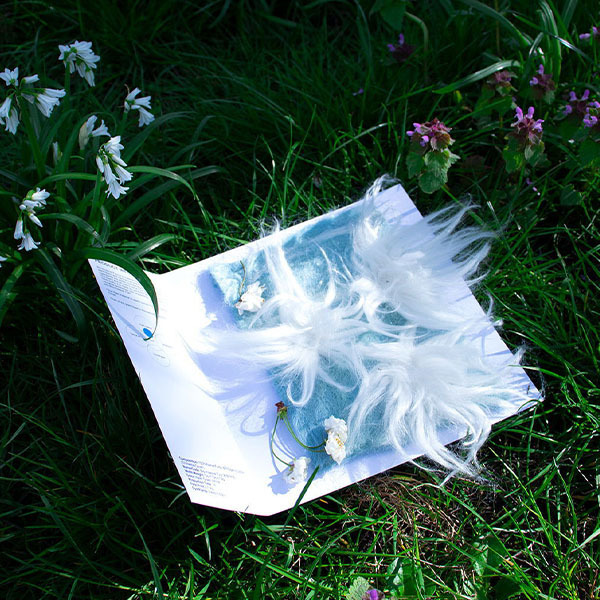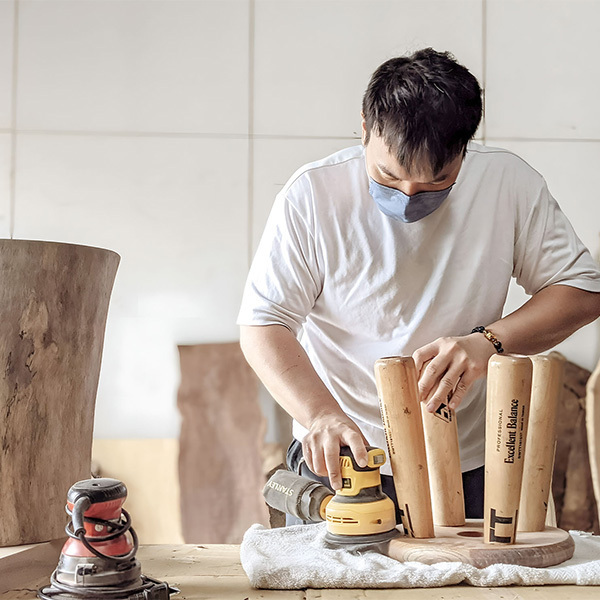Sea vegetable Circulation
合同会社シーベジタブル SEA VEGETABLE COMPANY
Open Funk
re:Mix is a circular kitchen mixer that works with the glass jars people have at home, that’s customisable and built to last. It is ethically made in Berlin from regional, reused and recycled materials, and is repairable and open-source. re:Mix lays the groundwork towards changing the way we make and fix home electronics.
<機械翻訳>
re:Mixは、家にあるガラス瓶で使える円形のキッチンミキサーで、カスタマイズ可能で、長持ちするように作られている。このミキサーは、ベルリンで地域の素材、再利用素材、リサイクル素材を使って倫理的に製造されており、修理可能でオープンソースである。
Frustrated with kitchen mixers breaking within months from purchase, we created a long-lasting, repairable kitchen mixer, to prove that circularity can go hand in hand with aesthetics and ease of use.
From electronic waste and huge CO2 emissions to poor working conditions and long supply chains, kitchen appliances contribute to some of the world’s most serious environmental and human rights problems of our times. They break easily, inhibit repairs and offer spare parts at exorbitant costs.
At every level, re:Mix is designed for the circular economy. In terms of materials, it reuses standard glass jars, has a 100% recycled, regional plastic casing, 100% recycled plastic feet, and uses locally 3D-printed parts. The design is modular and repairable, without the use of harmful adhesives. Assembly and repairs are done locally in Berlin in our own workshop. And a digital layer provides easy access to additional services: a buy-back scheme, a material passport and open-source documentation, guided repair tutorials, and easy spare part ordering.
Contrary to how appliances are built today, re:Mix is a local product made in Berlin. By using decentralised fabrication methods, publishing files open-source and using a local supply chain, we are circulating economic value in our community, creating local jobs and rebuilding the much-needed repair infrastructure. Our product design and production setup has been engineered to be replicable in other makerspaces such as FabLabs, while making use of locally-available materials - paving the way to a new type of scaling production and repairs for the local communities.
re:Mix is just the first step in paying the way for something bigger: A decentralised system for home electronics and components that are built and repaired locally, allowing anyone with a basic workshop to build their own home appliances - toasters, lamps, kettles, mixers, speakers and more; and anyone with a screwdriver to repair their own products.
<機械翻訳>
購入後数ヶ月で壊れてしまうキッチンミキサーに不満を抱いていた私たちは、長持ちし、修理が可能なキッチンミキサーを開発しました。
電子機器廃棄物や膨大なCO2排出量から、劣悪な労働環境や長いサプライチェーンに至るまで、キッチン用品は、現代における世界で最も深刻な環境問題や人権問題の一因となっている。厨房機器は簡単に壊れ、修理を妨げ、スペアパーツを法外な値段で提供する。
re:Mixはあらゆるレベルにおいて、循環型経済のために設計されている。素材の面では、標準的なガラス瓶を再利用し、100%リサイクルされた地域のプラスチック製ケーシング、100%リサイクルされたプラスチック製脚部を備え、現地で3Dプリントされた部品を使用している。デザインはモジュール式で、有害な接着剤を使わずに修理が可能。組み立てと修理は地元ベルリンの工房で行われます。また、デジタル・レイヤーにより、買い取り制度、マテリアル・パスポート、オープンソース・ドキュメント、ガイド付き修理チュートリアル、簡単なスペアパーツの注文といった追加サービスに簡単にアクセスできる。
今日の家電製品の製造方法とは対照的に、re:Mixはベルリンで製造されるローカル製品である。分散型の製造方法を採用し、ファイルをオープンソースで公開し、地元のサプライチェーンを利用することで、私たちはコミュニティで経済的価値を循環させ、地元の雇用を創出し、必要とされている修理インフラを再構築しています。私たちの製品設計と生産体制は、地元で入手可能な材料を利用しながら、ファブラボのような他のメイカースペースでも再現できるように設計されている。
re:Mixは、より大きなものへの道を開く第一歩に過ぎない:トースター、ランプ、やかん、ミキサー、スピーカーなど、基本的なワークショップさえあれば誰でも自分の家電製品を作ることができ、ドライバーさえあれば誰でも自分の製品を修理することができる。
REnato lab COO
E-waste is the fastest-growing waste stream in the world, making household electronic products a key focus in terms of the circular economy. While most discussions tend to revolve around large brand manufacturers, initiatives like the re:Mix project explore the potential of every aspect of the product value chain. This includes modular design, material selection, repairs, and even reverse logistics. Additionally, they combine regional production with open-source design, showcasing both creativity and ambition.
電子廃棄物は最も急速に増加している廃棄物であり、循環経済において家庭用のエレクトロニクス製品は重要な焦点となっています。多くの議論は大手ブランドメーカーを中心に展開されがちですが、re:Mixプロジェクトのようなイニシアチブは、製品バリューチェーンのあらゆる側面の可能性を追求しています。これにはモジュラーデザイン、素材の選択、修理に加えて、リバースロジスティクスまでも含まれます。さらに、地域生産とオープンソースデザインを組み合わせた、創造的かつ野心的なプロジェクトです。
株式会社大阪鉛錫精錬所 代表取締役社長
This project definitely has a seat at the dinner table. It is also a great conversation starter. The project addresses many questions on how we talk about what is good for the environment and embodies it in a playful functional kitchenware.
For one, consumption: using less, consuming less. Choosing well-made products made to last and to be tendered and fixed - contrasts to the models of limitless economic growth worship. Here, consumption has a ceiling. This reuse of glass jars stops us from consuming more storage containers, the mutli-mixer in-one reduces unidirectional e-waste.
Reduce, Reuse Recycle: The idea of adapting all jars around the house takes used jars back into the kitchen to reuse. When is reuse better than "recycling", by which measurements is it better than direct to landfill? The energy required to recycle the material is not always transparent to consumers, and not often in the public discourse, where only positive aspects of recycling is promoted.
Distributed: By making, adapting, and repairing an open and local process, knowing who makes the product, also makes it harder to throw away. It is a cultural shift (perhaps back in time), of how things and people interact. Wouldn’t it be wonderful if (outside of Europe) this mixer would be produced locally? Who will fix them? A community aspect to it would add to the pop/funky persona of the product. Would this be truly a distributed network and open-source? The business model would be nice if it were more elaborated.
About health: Avoiding health issues by using glass containers: chemical leaching from food touching plastics.
About the Plastic Mix: The product designers make the problem of the "color" of recycled plastic waste into a design element, breaking the mold of how the "problem" of recycling mixed color plastics, and resolving it in a playful way. White is usually preferred, and sorting by color is an additional step in the recycling process. If not white, most recycled plastic uses dye to become gray or black.
About Attribution: Finally, it would be nice to acknowledge the multi-headed, multi-purpose metal mixers found in many Indian (and perhaps other?) kitchens.
間違いなく、食卓に置きたいプロジェクトです。会話のきっかけにもなるでしょう。このプロジェクトでは、私たちが環境に良いことについて話すときに出てくる多くの疑問に答えを出し、それを遊び心のある実用的なキッチン用品に具現化しています。
消費について:より少なく使い、より少なく消費すること。長持ちし、手入れや修理が可能な、良質な製品を選ぶことは、無限の経済成長を崇拝するモデルとは対照的です。このプロジェクトは消費に上限を設けます。ガラス瓶の再利用は新しい保存容器の消費をストップし、マルチミキサー機能を1台に集約した設計は、再生不可能な電子廃棄物を削減します。
リデュース(削減)、リユース(再利用)、リサイクル: 家中のどんなサイズの瓶にも対応するというアイデアは、使用済みの瓶をふたたびキッチンに戻して再利用する機会を提供します。再利用がリサイクルよりも優れているのはどのような場合なのでしょうか?材料のリサイクルに必要なエネルギーは、消費者には必ずしも明らかにされず、リサイクルの肯定的な側面ばかりが宣伝される公の議論にはあまり出てこない話題です。
分散型: 製品の製造から適応や修理までのオープンでローカルなプロセスを構築することで、誰がその製品を作っているのかを知ることができ、捨てることが難しくなります。それは、モノと人との関わり方の文化的な転換(おそらく過去に遡る方向での)です。このミキサーが地元で(ヨーロッパ以外でも)生産されるようになったら、素晴らしいと思いませんか?そのとき修理を担当するのは?コミュニティ的な側面があれば、製品のポップでファンキーな個性が増すでしょう。このプロジェクトはいずれ真の分散型ネットワークで、オープンソースになるのでしょうか?ビジネスモデルはもっと詳しく説明されるといいと思います。
健康: ガラス容器を使うことで、プラスチックに触れた食品からの化学物質の溶出という健康問題を回避しています。
プラスチックの混合:リサイクルされたプラスチック廃棄物の欠点である「色」もデザイン要素にしており、混色プラスチックのリサイクルという「問題」を遊び心で解決しています。
リサイクルされたプラスチック廃棄物の「色」の問題もデザイン要素にしており、混色プラスチックのリサイクルという「問題」を遊び心で解決しています。(白色が選好されるものの、色分別という追加のリサイクルプロセスが必要になる。白でない場合、ほとんどのリサイクルプラスチックは灰色/黒に染められる)
アトリビューション(帰属):最後に、インドの(そしておそらく他の地域でも?)キッチンの多くで見られる、ブレード交換式の多目的金属製ミキサーの良さが認知されるのは良いことでしょう。
建築家 / 成瀬・猪熊建築設計事務所 共同主宰
いつか使おうと溜まっていく空瓶。壊れたら捨てるしかない家電。そうした日々の小さなフラストレーションを鮮やかに解消してくれる、可愛らしくも発明的なプロジェクトです。付加価値を高めるため高性能化する家電は、実は使いこなせない機能がいっぱい。本当に欲しい最低限のシンプルな機能だけにすることで、構造もシンプルになり、修理も容易になる。とても合理的な思想によって作られてます。瓶の口はいろんなサイズがあるので、どう汎用性を持たせているのか気になりました。
MATR
MATR
TATAMI ReFAB PROJECT
HONOKA
Dodola
Pjorkkala
CirculaRElectronics by VERTMONDE
VERTMONDE ECUADOR
MateRe-DPP
株式会社digglue / digglue. inc
Transparent Solar Windows
VP for Ubiquitous Energy
プロジェクト「TSUMUGI」
一般社団法人アップサイクル General Incorporated Association Upcycle
The Mother Reef
Oyster Heaven
Anam PALF® by Ananas Anam
Ananas Anam
DiFOLD Origami Bottle
DiFOLD
Co-producing value-added, biodegradable plastics and additives from agricultural byproducts
Ourobio
Infinity Toy Box
Infinity Toy Box
Lichens as an bioindicators of "Well-being"
Yixuan Wang (collaborated with Julio Obscura)
Tejiendo la calle
Tejiendo la calle
comvey シェアバッグ®︎
株式会社comvey 代表取締役 / Comvey. Inc. CEO
“捨てないくらし”をかなえる。「くらしのサス活 Circular Action」
株式会社ECOMMIT ブランド戦略部 広報ブランディンググループ 所属
Hair Recycle
Dung Dung asbl
Lalaloop Reusable cup system for a circular city
OysterAble co., ltd.

Bio-invasive Textile Library
Bio-invasive Lab Ltd/ Central Saint Martin-Ma Biodesign
MateRe
株式会社digglue / digglue inc.
Briiv Air Filter
Five Create Ltd.
Gravity Wave - Plastic Free Oceans
GRAVITY WAVE
Seaweed Dialogues
Alberte Holmø Bojesen
記憶のえんぴつ
obake
